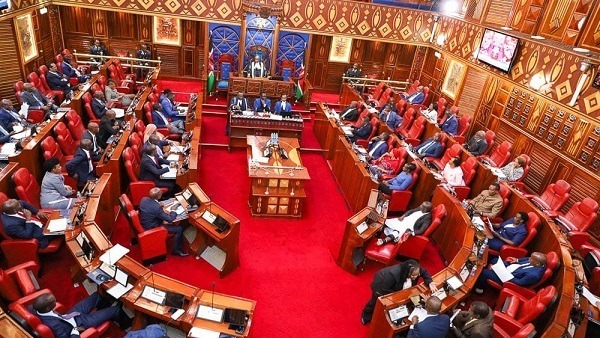![[PHOTOS] Ex-nominated senator Orwoba denied entry to Senate](/_next/image?url=https%3A%2F%2Fcdn.radioafrica.digital%2Fimage%2F2025%2F08%2F4bbff2fe-8458-4e68-a277-5041389663c3.jpg&w=3840&q=100)

The highly anticipated impeachment trial of Kericho Governor Erick Mutai has officially commenced at the Senate.
According to the official programme released by the Office of the Senate Clerk, the proceedings were to kick off at 9am with a closed-door pre-hearing meeting for senators.
This internal session will allow members to review the rules of procedure and the structure of the trial before the official opening.
The public session was to begin at 10am with preliminaries, including the recital of the Senate’s mandate and the introduction of parties.
Members of the County Assembly of Kericho, who brought the charges, were formally introduced alongside their legal counsel.
Governor Mutai and his defence team will also be presented before the House.
At 11am, the charges against the governor will be read out, setting the tone for the day’s deliberations.
This will be followed by a 90-minute session devoted to preliminary questions and issues that may arise before the hearing of evidence begins.
After a lunch break from 1pm to 2:30pm both sides will be granted time to make opening statements.
The County Assembly, through its representatives, will take 30 minutes to lay out its case, after which Governor Mutai’s defence team will also be accorded half an hour to respond.
The bulk of the afternoon session, running from 3:30pm to 6:30pm will focus on the presentation of evidence.
The County Assembly will have a maximum of three hours to present its witnesses and conduct re-examinations.
The governor’s side will have up to two hours to cross-examine the witnesses.
The day’s proceedings will adjourn at 6:30pm, with the trial expected to continue in subsequent sittings until the Senate reaches a verdict on whether to uphold or dismiss the impeachment motion.
Governor Mutai’s case has drawn widespread interest, not only in Kericho but across the country, as it will test the political balance of power between county assemblies and governors, while also underscoring the Senate’s constitutional role as arbiter in impeachment disputes.
The county assembly is represented by 12 lawyers led by Elisha Ongoya. He is assisted by Kimutai Bosek, Sharon Mibey, Elias Mutuma, Hillary Kiplangat, Brian Langat, Geoffrey Langat and Victor Kibet.
Others are Evans Kiplangat, Elvis Kipkorir, Joel Wakhungu, and Vincent Kipronoh.
Also lined up in the list submitted to the Senate are four legal officers-Brian Maingi, Ian Kiplangat, Mitchel Mutuma and Japhet Koech.
Mutai, on his part, is represented by six lawyers led by Katwa Kigen.
Others are Peter Wanyama, Rose Thiong’o, Doris Ng’eno, Joash Mitei, and Evanson Kirui.
While making introductory remarks, County Assembly lead counsel Elisha Ongoya requested to submit new evidence something that was strongly rejected by Mutai’s defence team.
“Mr Speaker sir, we strongly object to attempts to introduce new evidence at this point because we will not have had opportunity to have looked at them and respond to them considering that today is scheduled for hearing,” said Kigen.
The document ncluded payment vouchers for the department for agriculture, lands and physical planning, which the lawyer had not reproduced.
Others are witness statements which include staff redeployment memos, Mpesa statements, report on the adhoc committee on kazi mtaani, payment extracts and termination letters, among others.
In his ruling, however, Speaker Amason Kingi allowed the submission of the documents.
“If I heard the counsel for the assembly correctly, the documents were omitted by mistake during the compiling, they do not introduce new evidence...and therefore, pursuant to rule 30 of the rules of procedure, I will allow those documents to be submitted,” Kingi ruled.

















